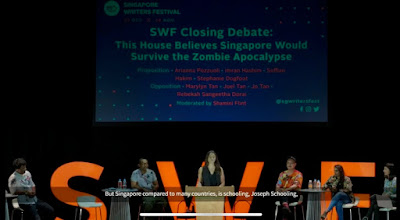The second weekend of Singapore Writers Festival (SWF) has passed and the event wrapped up. I watched a lot more sessions than I bothered to blog about. It's well curated, and in a way, going digital reached out to more writers in their own time zones, and while it's less exciting because of decreased traveling, it's more exciting too, to see who is willing to come on board as a speaker. Both speakers and audiences, we're no longer restricted by traveling schedules.
I was waiting to hear how Liu Cixin "views the world through the lens of science and imagination." However, his session titled 'The Possibilities of Science and Imagination' (刘慈欣: 科学与幻想的无限可能) was never put up online in spite of the blurb stating that it would be available as video-on-demand with English subtitles. Oh well.
This first digital edition has allowed many good friends living in different cities to catch the sessions too. We could either catch it together live, or we schedule another timing to watch the video-on-demand-replay. It was fantastic! Being able to catch these speakers and events from the comfort of home makes it so awesome. I'm pretty sure 2021's edition will not see physical seats being filled to capacity either (looking at the idiocy across cities and how many are actually falling ill, the virus is not going away so soon), so this digital format should take root and be an option for future editions of the SWF.
In Conversation: Margaret Atwood
Moderated by Balli Kaur Jaswal, Margaret Atwood's session was a little eerie. Held on the momentous day of the US elections on the night of November 3 at 9pm (8am in Toronto where the author lives), she talks about "the power of a writer engaging with critical conversations, and the ways in which fiction can witness, resist and inspire regardless of where we are in history."
The 80-year-old author makes a differentiation between science fiction (say from H.G. Wells) and speculative fiction (Jules Verne). I laughed when she said she "do[es]n't do Martians, aliens, zombies or dragons in novesl", but happy to put them into her poetry. The moderator pointed out that Margaret Atwood's fiction might not be necessarily speculative, but it contains lots of worlds, and parallel worlds. She said that reading takes us to parallel worlds, and it isn't too far away from how we live. She said she tries not to put in things in her speculative fiction that humans haven't done already.
Margaret Atwood was witty and sharp, and didn't allow the US elections or talk of the Republic of Gilead take hold of the entire conversation. It was a lovely little chat. She noted that all of us are ordinary people living in an extraordinary situation (the pandemic), and being hampered from just 'getting on with it'. She talked about "equitable social structures", and I hope we do get there, eventually. Not in my lifetime for sure.
'The Craft of Horror in Korean Storytelling', Janet Hong and Ha Seong-nan
Giggled and decided to catch 'The Craft of Horror in Korean Storytelling'. Moderated by Anya Goncharova, literary translator Janet Hong and South Korean author Ha Seong-nan speak about their creative process, and discuss the horror genre in contemporary Korean storytelling. She writes about everyday horror, and the horror that women face.
I'm not interested in Korean dramas, but a tad keen on their horror films. (Not 'Kingdom' though, that's so long-winded.) Films are now so easy to imagine. I wanted to hear how the writers translate their genre onto paper, and how translators do their job without re-interpreting the authors' intent and meaning in each scene.
Ha Seong-nan shared that for some of the works that were written 20 years ago, the language used and slang are starkly different from what are used today. She agreed very much with what Janet Hong has done with the English translations. When Janet Hong translated them as were written in 2002, and the collection is published in English in 2020 as 'Bluebeard's First Wife', she tweaked them slightly. I've never read any of Ha Seong-nan's translated works. But after this, perhaps I will. The author has five collections of short stories. The translated works hold short stories, and those always work well for me.
SWF Closing Debate: This House Believes Singapore Would Survive the Zombie Apocalypse
With a title like that, of course I had to watch the festival's Closing Debate. Hahaha. The catch- I will have to sit in front of the screen at the appointed time because it isn't slated to be a video on-demand-replay.
Moderated by Shamini Flint, the teams had four members each. Many pop references made too. They brought in city planning, underground train stations, HDB bomb shelters, migrant workers, etc. I'm definitely on the opposing side. How on earth can Singapore ever survive a zombie apocalypse without locking everybody underground or at home for months on end? And that was how the proposition said we could survive because we could really stockpile. Hahahah.
The Opposition's Rebekah Sangeetha Dorai's points were hilarious. The Q&A segment before teams' final speakers concluded the debate was quite funny too. The moderator was in great form. Hahaha. Zombie Singlish. Oof. The audience voted online for the winner of the debate. I cast my vote 20 seconds to time. 67% of us voted for the Opposition as the winner. So without cries of 'recount' or 'voter fraud', the debate ended with 'Singapore Would Not Survive the Zombie Apocalypse'. But of course. 😂



No comments:
Post a Comment